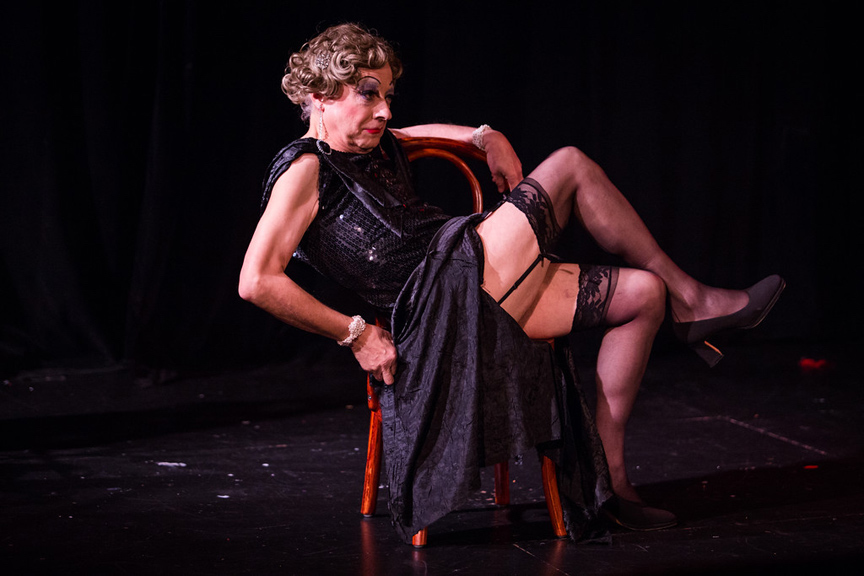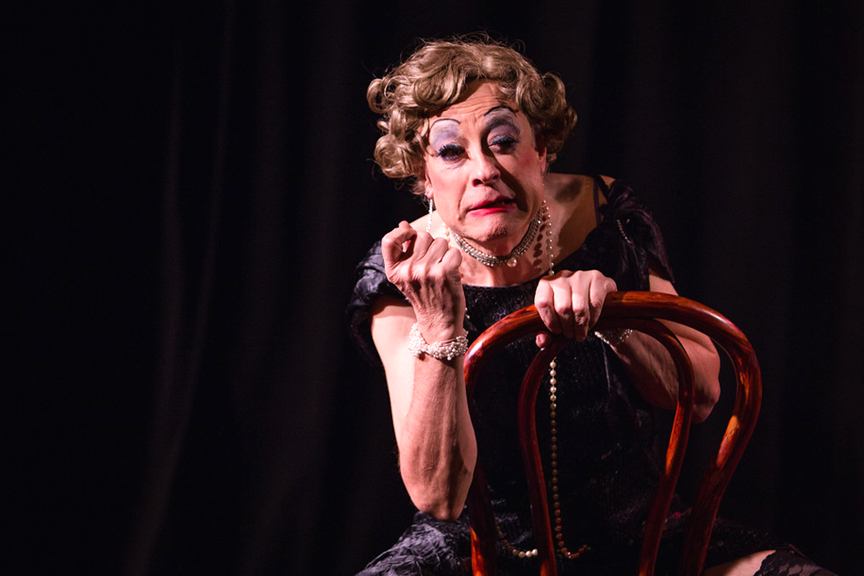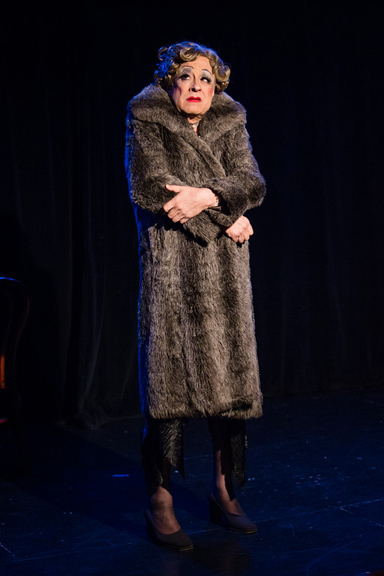Lavender Songs: A Queer Weimar Berlin Cabaret- Droll, Frightening, Moving, Relevant
By Alix Cohen
What better way to spend the evening of the inauguration than at theatrical cabaret that features a proud, brave, wounded, defiant performer representing persecuted minorities. Jeremy Lawrence’s stage alter-ego Tante Fritzy hit the streets at 15, was a rent boy, served in WWI, and finally became a successful cabaret artist. We’re in Berlin 1920-1930, just before Hitler took full power. Things are radically changing. Brutality and discrimination are omnipresent.
This is what good theater is about. It informs, makes one think, feel, and entertains. Though innately protest, the piece is not a polemic. “In the face of the Trump ascendency it couldn’t be more important than to show today’s audiences how the cabaret artists of the Weimar Era responded fearlessly to the rise of Hitler with subversive satire and ebullient sexual naughtiness.” Jeremy Lawrence
“Can Love Really Be a Sin?” (Bruno Balz/ Lothar Bruhne) Fritzy asks rhetorically with an eyelash flutter and a little fanny wiggle. “I Don’t Know Who I Belong To” (Friedrich Hollaender) she continues gracefully crossing her gartered legs. I belong to myself… the artist resolves.
Dressed and made up with care, not to be attractive but rather to reflect the period, Fritzy speaks to us with riveting intimacy. Vocals emerge with moxie, sarcasm and gut wrenching immediacy. Head high, she walks into the audience sometimes flirting, at others provoking.
“The American Depression got me depressed…I’m glad to see all you have some money…” The show is peppered with personal anecdotes, off the cuff remarks “…No, I’m not Jewish. I can’t help it if I look that intelligent…” and a few eclectic references. Paragraph 175, for example, refers to the anti-homosexual law on Germany’s books at the time. Poetry that sounds like monologue is acted with utter commitment.
The thoroughly unnerving “Munchhausen” (Friedrich Hollaender) screams …Liar! Liar”… demanding back the national flag of red, black, and gold rather than one with “that thing that zigs and zags.” (A swastika)


Fritz Lohner-Beda/ Richard Fall’s story-song “Moritz” finds its singer draped across a chair to best advantage-ostensibly nude. Moritz is a heartless bastard. You know the type. The performer allows herself to go over the top here, there’s a sob in the desperately plaintive vocal. …Moritz, Moritz, Mortiz…
Numbers that might further reflect (her) personal observation and/or experience are palpably painful. Donning an old fur coat, Fritzy offers “Out of Work” (Carl Wehner) “…I always thought that if you lived in a democracy/You’d have some control over your life…” and “Peter, Peter” (Friedrich Hollaender/ Rudolph Nelson) an extraordinarily tender love song wherein Fritzy regrets being cruel to the one person who accepted everything. Get out your handkerchiefs (really.) The Jewish lyricist escaped Germany to Hollywood, its Jewish composer survived the war hiding in the Netherlands.
“A Little Attila” -The Hun (Kurt Tucholsky/Rudolph Nelson)…A cute little brute/Who knows how to shoot…is a hoot. Its Jewish lyricist committed suicide in 1935. “Masculinum-Feminium” (Marcellus Schiffer/ Mischa Spoliansky) is a darkly comic number with lyrics as clever as anything written by Gilbert and Sullivan or Ogden Nash plus bite. Schiffer committed suicide in 1932. Spoliansky escaped to the UK.
As Fritzy sings “Don’t Show the World Your Heart” (Bruno Balz/ Lothar Bruhne) she takes off her costume, wig and make-up dressing in a man’s attire. The number is as affecting as anything I’ve seen onstage. You might’ve heard a pin drop. An encore of “Danke Schon es war Bezaubernd” (Raimund Dannberg/ Earnst Sennhofer) evokes the best of Charlie Chaplin. After clowning comes the truth. Or, perhaps, in clowning lies the truth. “Be careful out there. He’s not going away,” Fritzy/Lawrence warns.
I can’t recommend this evening highly enough.
Jeremy Lawrence has been enmeshed in the Weimar tradition since developing Cabaret Verboten for The Mark Taper Forum in 1990. The actor/playwright is also a lyricist who studied German to better approach the material. All English lyrics and poetry are his own. These showcase not just aptitude of craft but depth of comprehension and empathy.
The piece is beautifully directed by Jason Jacobs of TOSOS (The Other Side of Silence), “dedicated to preserving the theatrical heritage of the LGBT community through the development of new plays by emerging artists as well as revivals of established works.”
Ariela Bohrod provides highly accomplished, symbiotic piano accompaniment. Lawrence met the young woman performing for the Gay/Straight Alliance for Safe Schools in Madison Wisconsin. She was 11 at the time. “They wanted someone still in school. She was amazing.” Still is.
Jeremy Lawrence’s Lavender Songs: A Queer Weimar Berlin Cabaret
Pangea – Second Avenue at 11th Street
February 4, March 11, April 8





















